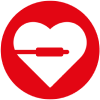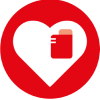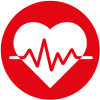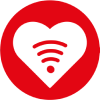Overview of services
Our services include the diagnosis and therapy of cardiological issues: Cardiovascular diseases, cardiac arrhythmias, heart muscle diseases, heart valve defects, stroke prevention and hypertension.
In addition, we offer diagnostics and therapy for suspected thrombosis and peripheral circulatory disorders (leg blood circulation). In addition, further internal diagnostics with sonographic examinations, laboratory and lung function examinations are offered on request.
Internal diagnostics and therapy
Cardiac catheter
Cardiological examination of the coronary vessels, the heart muscle and the vessels near the heart.
Cardiovascular and vascular diagnostics
Another focus is the detection and therapy of cardiac arrhythmias and syncopations caused by cardiac arrhythmias. Rhythm, syncope, pacemaker and ICD consultations are offered. All findings, images and video sequences can be called up at any time from any site-related workstation.
In our cardiac catheter laboratory in St. Josefs Hospital, which is located in the immediate vicinity of our practice in Wiesbaden, we offer outpatient cardiac catheter examinations and balloon dilatations of the coronary arteries (Percutaneous coronary intervention (PCI) incl. stent implantations) as well as outpatient pacemaker implantations.
The following test methods are available for this purpose:
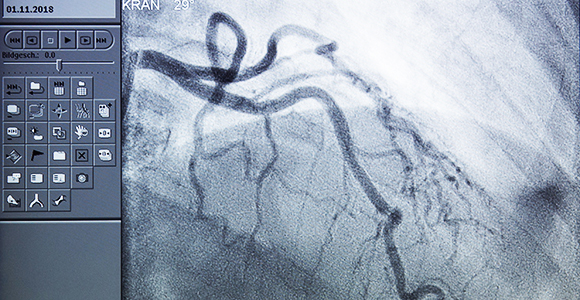
Cardiac catheter
During the examination, which has been continuously optimised over the last 50 years and is therefore very low-risk, it is possible to reach the heart via a very thin and soft catheter with the approximate diameter of a ballpoint pen refill and to visualise the vessels using an X-ray image and a small amount of contrast medium. If narrowing of the coronary vessels is detected, a decision can be made, depending on the findings, as to whether an expansion and implantation of a vascular support (so-called stent) is necessary during the same examination. In most cases it is now possible to reach the heart from the wrist. This eliminates the need for the usual strict bed rest after puncture of the inguinal vessels. The patient can usually return home safely after only 4 hours. Even if a stent has to be inserted, the time of the stay is only extended until the next morning, according to the current guidelines.
We ourselves and in cooperation with our partners also offer further diagnostic procedures for cardiovascular diagnostics. These include stress echocardiography, myocardial scintigraphy, cardio MRI and cardio CT, which give us the opportunity to have a cardiac catheter examination only if really necessary.
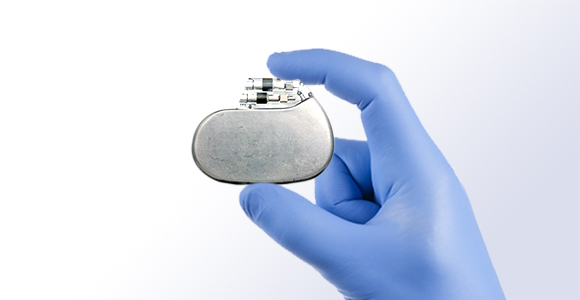
Cardiac pacemaker
Since 2007, cardiac pacemaker systems and ICDs have been used in Herz-Kreislauf-Praxis and subsequently cared for. For 8 years, our practice has concentrated on performing the necessary operations for the insertion of all pacemaker systems (including ICDs and so-called biventricular systems) completely on an outpatient basis. Based on our expertise, numerous health insurance companies have concluded contracts with us for outpatient implantation.
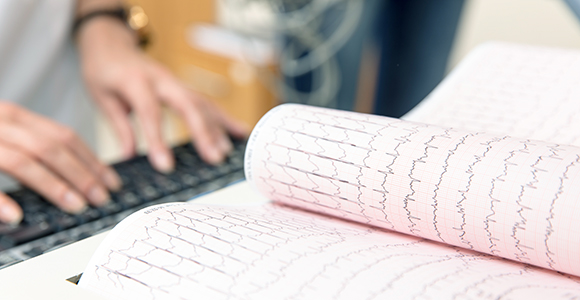
ECG
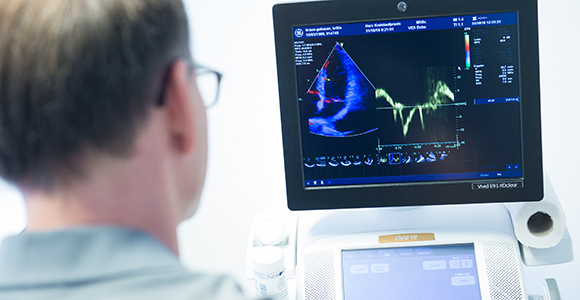
Ultrasound examination
Echocardiography can be used to assess the pumping power of the heart, the size of the ventricles and the large vessels near the heart, as well as the function of the valves. A structural heart disease can thus be detected quickly, which is crucial for the clarification of a cardiac insufficiency or a blood circulation-related heart disease.
As a transthoracic echocardiogram (TTE), the heart is imaged from the outside by placing an ultrasound head on the chest. In special cases, a transesophageal echo (TEE) can be performed. For this purpose, the heart is examined via the oesophagus using a tube with an ultrasound probe at the end. Patients can be put into twilight sleep for the latter examination. By combining echocardiography with bicycle ergometric or pharmacological stress as a so-called stress echo, it is also possible to make functional statements about the blood circulation in the heart.



